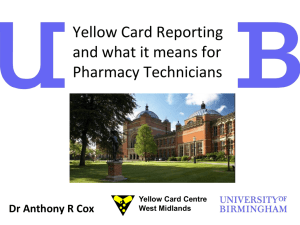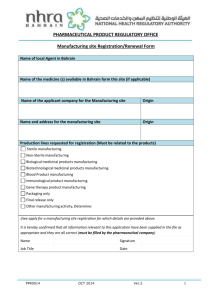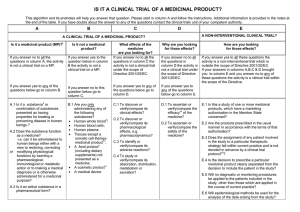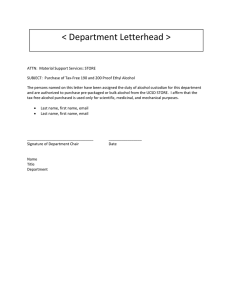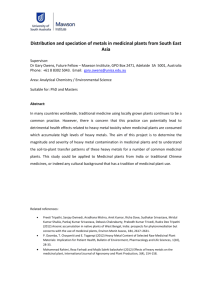IS IT A CLINICAL TRIAL?
advertisement
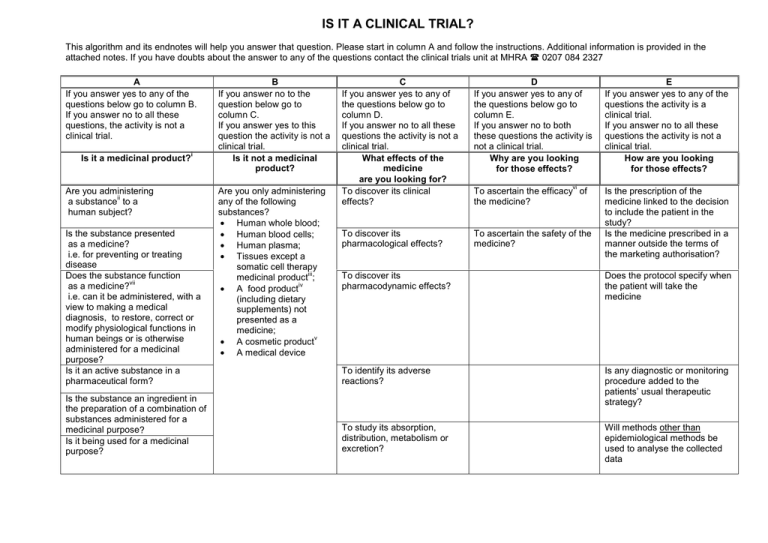
IS IT A CLINICAL TRIAL? This algorithm and its endnotes will help you answer that question. Please start in column A and follow the instructions. Additional information is provided in the attached notes. If you have doubts about the answer to any of the questions contact the clinical trials unit at MHRA ( 0207 084 2327 A If you answer yes to any of the questions below go to column B. If you answer no to all these questions, the activity is not a clinical trial. Is it a medicinal product? i Are you administering ii a substance to a human subject? Is the substance presented as a medicine? i.e. for preventing or treating disease Does the substance function vii as a medicine? i.e. can it be administered, with a view to making a medical diagnosis, to restore, correct or modify physiological functions in human beings or is otherwise administered for a medicinal purpose? Is it an active substance in a pharmaceutical form? Is the substance an ingredient in the preparation of a combination of substances administered for a medicinal purpose? Is it being used for a medicinal purpose? B If you answer no to the question below go to column C. If you answer yes to this question the activity is not a clinical trial. Is it not a medicinal product? Are you only administering any of the following substances? · Human whole blood; · Human blood cells; · Human plasma; · Tissues except a somatic cell therapy iii medicinal product ; iv · A food product (including dietary supplements) not presented as a medicine; v · A cosmetic product · A medical device C If you answer yes to any of the questions below go to column D. If you answer no to all these questions the activity is not a clinical trial. What effects of the medicine are you looking for? To discover its clinical effects? D If you answer yes to any of the questions below go to column E. If you answer no to both these questions the activity is not a clinical trial. Why are you looking for those effects? To discover its pharmacological effects? To ascertain the safety of the medicine? vi To ascertain the efficacy of the medicine? E If you answer yes to any of the questions the activity is a clinical trial. If you answer no to all these questions the activity is not a clinical trial. How are you looking for those effects? Is the prescription of the medicine linked to the decision to include the patient in the study? Is the medicine prescribed in a manner outside the terms of the marketing authorisation? To discover its pharmacodynamic effects? Does the protocol specify when the patient will take the medicine To identify its adverse reactions? Is any diagnostic or monitoring procedure added to the patients’ usual therapeutic strategy? To study its absorption, distribution, metabolism or excretion? Will methods other than epidemiological methods be used to analyse the collected data i Regulation 2 of the "Medicines for Human Use (Clinical Trials) Regulations 2004 defines "Medicinal product". It includes the definition of "medicinal product" in Article 1.2 of Directive 2001/83/EC which applies for the purposes of the Directive (2001/20/EC). It also includes the definition contained in section 130 of the Medicines Act 1968 because the pre-Ist. May UK regime operated under the Act. It is possible that section 130 also applies to substances that are not medicinal products but are deemed to be medicinal products by orders made under sections 104 and 105 of the Act. Consequently the UK regime covered some products outside the EC definition. There is likely to be very few because the definition in section 130 largely overlaps with the EC definition and we are not aware of any products deemed to be medicinal products under sections 104 and 105 of the Act. "A guide to what is a medicinal product" (the MHRA Guidance note number 8) provides further guidance and is accessible on the MHRA website (htttp://www.mhra.gov.uk) ii Substance is any matter irrespective of origin e.g. human, animal, vegetable or chemical. iii Somatic cell therapy medicinal products use somatic living cells of human (or animal) origin, the biological characteristics of which have been substantially altered as a result of their manipulation to obtain a therapeutic, diagnostic or preventative effect (in humans) through metabolic, pharmacological and immunological means. iv Any ingested product which is not a medicine is regarded as a food. A food is unlikely to be classified as a medicine unless it contains one or more ingredients generally regarded as medicinal and indicative of a medicinal purpose. v The Cosmetic Directive 76/768/EC, as amended (implemented in the UK as the Cosmetic Products (Safety) Regulations 1996(S.I. 1996/2925) as amended) harmonises the requirements for cosmetics in the European Community. A "cosmetic product "means any substance or preparation intended for placing in contact with the various external parts of the human body (epidermis, hair system, nails, lips and external genital organs) or with the teeth and mucous membranes of the oral cavity with the view exclusively or principally to cleaning them, perfuming them or protecting them in order to keep them in good condition, change their appearance or correct body odours. vi Efficacy is the concept of demonstrating scientifically whether and to what extent a medicine is capable of preventing or treating a disease and derives from EU pharmaceutical legislation.
